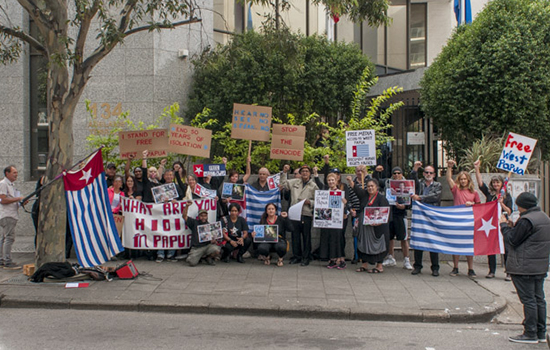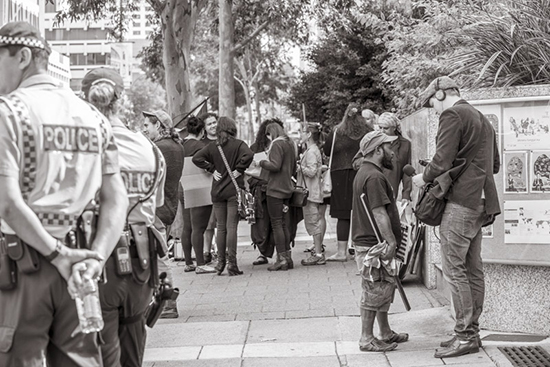
As the Melanesian Spearhead Group faces a critical decision about West Papuan membership next week, against Indonesian opposition, Edith Cowan University student journalist Shelley Timms reports on solidarity developments in Australia.
Placards and banners line the pavement, showing images of the gruesome atrocities that are all too common in the colonised Pacific territory of West Papua.
Australians and Papuans alike were banded together outside the Indonesian Consulate earlier this year in a show of solidarity against the actions of the Indonesian government in West Papua.
The protest came some 12 hours after the deaths by firing squad of the Bali Nine pair Andrew Chan and Murayan Sukumaran, and protesters expressed their discontent over the Jakarta government’s decision to go ahead with the executions.
“If you are against substance abuse … then get into your clubs and stop those people serving that toxic s*** that kills Australians!” Robert West said during his speech at the protest.
“Don’t waste your time looking out, go over to the mirror, and have a look at yourself!” he continued, peering up at the windows of the Indonesian Consulate, loudspeaker in hand.
The actions of the Indonesian government, both in West Papua andover the Bali Nine duo, had angered many.
The campaign for free and open media access has been a widespread one, with protests also taking place in Brisbane and Sydney on the same day.
Alban Vinevel, a member of Brisbane-based campaign organisation Rize for West Papua, explains the importance of raising awareness – “turning a blind eye and allowing the media blackout to continue for as long as it has in West Papua is one of the greatest acts of injustice the free world has ever perpetuated.”
Understanding through history
To truly understand why the cause is so important, we must understand the history of West Papua.
West Papua is a nation crippled by the occupation of military forces and the unspeakable crimes committed by them.
Its tumultuous history is stained with the blood of the generation before them, with half a million West Papuans killed by the Indonesian military since 1962, say campaigners.
On average, 10 000 are killed each year, they claim.
“West Papua is currently the most heavily militarised zones in the Asia-Pacific region, with plans to further increase the military presence,” says Vinevel.
In 1998, one of the most shocking acts of mass murder was committed by the Indonesian military in West Papua, he says.
Around 200 villagers were rounded up onto boats, taken out to sea and thrown overboard to perish in the Pacific waters. This violation of human rights and disregard for human life is not an isolated incident, however knowledge of such events is not widespread given the media blackout.
“This dark shroud of secrecy has created a dangerous vacuum in which Indonesia’s oppressive government has managed to operate unchecked for decades, exercising state sanctioned murders, gross violations of human rights, and systematically silencing and driving into exile any voice that dares to utter the word freedom,” says Vinevel.
'Untenable and malicious'
Professor David Robie, director of the Pacific Media Centre and convenor of the Pacific Media Watch freedom project, describes the Indonesian government’s media ban as “untenable and malicious”.
“Indonesian security forces and other authorities have been systematically violating human rights in West Papua on a scale not seen elsewhere in the Asia-Pacific region. And this is happening with impunity and blatant disregard for world opinion.”
Members of the Free West Papua Campaign Australia are being proactive in taking on the Indonesian government, with the Free West Papua political party coming to fruition in 2015.
The protest outside the Indonesian Consulate was an opportunity to recruit prospective members, with membership forms being passed around.
Free West Papua Perth member Joy Madden made a speech, stressing the importance of working together to lift the media ban, and the role the political party would play in doing so.
“Australia must act. Australia cannot allow its neighbour to be annihilated and assume Australia itself will not be affected.”
Alphie, the ambassador
When I first encountered Alpheus Meage, he was standing in the middle of the protest, ukulele in hand, singing about the freedom of West Papua.
The crowd followed every word, occasionally singing along and cheering.
It was clear he had become an ambassador for his country, fighting tirelessly for its independence and access to free media. he invited me to the protest, and then for coffee to discuss his experiences with Free West Papua.
After the protest, I was greeted with a warm hug and a lively chat as he packed up his car.
As the crowd thinned out, he hugged the protesters goodbye and wished them well. The Free West Papua community is a close-knit one.
Joy Madden told me me that Alpheus was the reason they had became involved with the issue, saying he was struggling to “convince the Australian government that he needed asylum because Australia does not recognise the genocide".
I learned that he was here in Australia under a protection visa, which was hard to obtain but finally granted when the government believed he was in enough danger from the Indonesian government to be protected under Australian law.
With a grin, he informed me that he had been granted permanent residency this year, something he had been aiming for since his arrival in 2009.
Dangerous liaisons
Alpheus was a staunch supporter for allowing international journalists into West Papua.
Previously, international journalists had been punished for their work in the Pacific territory, because the Indonesian government had enforced a total media ban.
International journalists caught producing news were punished, as seen previously with the cases of Valentine Bourrat and Thomas Dandois.
The two French journalists were detained in West Papua for 11 weeks under supposed immigration charges. They were visiting the country on tourist visas, as journalism visas are hard to obtain and require strict monitoring from the government.
“I think the Indonesians shot themselves in the foot by detaining Bourrat and Dandois. Overnight Jakarta’s claims of having a more 'open' policy were exposed for what they are – a cynical sham,” Dr Robie said.
“But no matter how concerned we might have been for the French journalists, we should be more concerned for their local contacts, Papuans who were put at risk, detained and badly treated. I understand some are still imprisoned over trumped up charges, or no charges at all.”
The media ban concerns academics and civilians alike.
Need for young journalists
“The Indonesian government, doesn't allow international journalists to get to West Papua. We need free access for journalists in West Papua. I want young journalists to know about West Papua.” says Alpheus.
He believes opening up West Papua to the international media would bring attention to the atrocities faced by the indigenous people, and be a driving force in changing the oppressive rule of the Indonesian government.
Despite all of the work being done by Australian campaign groups such as Free West Papua and Rize for West Papua, as well as West Papuan expats like Alpheus, awareness about the issue is spreading at a disappointing rate.
Many involved with the issue believe little progress is being made, which has resulted in the situation in West Papua being swept under the rug.
“Jakarta has simply given a fig leaf to the media ban.” says Dr Robie.
Joy Madden, Free West Papua Party coordinator agrees.
In her speech to the members of the protest outside the Indonesian Consulate, she made the point that Australians need to help the West Papuans, either by raising awareness or taking an active role in campaigning for open media access.
She believes the newly-formed political party will be the group that brings change to the situation in West Papua.
“A small rudder can turn around a great ocean liner. The West Papua Party will be that rudder within the Australian government.”
News broke of Joko Widodo’s decision to allow international journalists into West Papua on May 9. Journalists must obtain permits, however, and must not publish any content that "defames" Indonesia in any way.
"Beginning today, Sunday, I [will] allow the foreign journalists, if they want, to go to Papua just like the other regions," said President Joko Widodo in an interview with Antara News.
Shelley Timms is a journalism major at Edith Cowan University in Perth, currently completing a Bachelor of Communications.




